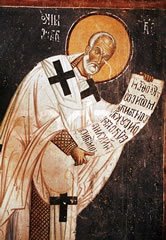
The whole counsel of God concerning all things necessary for his own glory, man's salvation, faith and life, is either expressly set down in Scripture, or by good and necessary consequence may be deduced from Scripture: unto which nothing at any time is to be added, whether by new revelations of the Spirit, or traditions of men . . .
Westminster Confession, chapter 1, article 6
One of the issues resolved by the Reformers was that of final authority, i.e., Are the Scriptures sufficient for doctrine and life? The Reformers, of course, answered in the affirmative. Louis Berkhof summarized their case as follows:
In Scripture each succeeding book connects up with the proceeding (except in contemporary narratives), and is based on it. The Psalms and the Prophets presuppose the Law and appeal to it, and to it only. The New Testament comes to us as the fulfillment of the Old and refers back to nothing else. Oral traditions current in the time of Jesus are rejected as human inventions, Matt. 5:21–28; 15:4, 9; I Cor. 4:6. Christ is presented to us as the acme of the divine revelation, the highest and the last, Matt. 11:27; John 1:18; 17:4, 6; Heb. 1:1. For the knowledge of the way of salvation we are referred to Scripture only, to the word of Christ, and the apostles, John 17:20; I John 1:3 . . .
Both Rome and the Anabaptists rejected the sufficiency of Scripture. Rome put as Scripture’s rival her church councils and traditions, with the ultimate authority residing in the pope. The Anabaptists, however, had a low view of Scripture for other reasons: they sought guidance from an “inner light” and direct revelations from God, resolving that the Spirit worked apart from the Word because the Word was dead.
Swarmers
Renting the Spirit from the Word by claiming direct revelations from God was something the Reformers could not abide. For that reason, Martin Luther derisively referred to them as “swarmers” because they were “swarming everywhere, deranged by the devil, regarding Scripture as a dead letter, extolling nothing but the Spirit and yet keeping neither the Word nor the Spirit.”
Likewise, in speaking of the link between the Spirit and the Word, John Calvin wrote . . .
Two things are connected here, the Word and the Spirit of God, in opposition to the fanatics, who aim at oracles and hidden revelations apart from the Word.
Modern Swarmers
In my years as a Pentecostal I saw the shipped-wrecked lives of those who listened to the modern swarmers. I’ve also experienced (and am still experiencing) the derision of unbelievers as they scoff at Christ and His followers because of those who claim that God is whispering in their ear. Worst of all, these false prophets blaspheme our God by taking His name in vain. It is for this reason that God commanded that they be put to death (Deut. 13, 18:20-22, 13:12-13; Ez. 13:1-9; Zech. 13:3).
Today, of course, we do not put false prophets to death. Instead, the church’s obligation is to withhold the Lord’s Table from them (see Heidelberg Catechism Q & A 82 and the accompanying Scriptures: 1 Cor. 11:17-32; Ps. 50:14-16; Isa. 1:11-17). If the offender still refuses to repent of his errors, he is to be removed from Christ’s church through excommunication (see Q & A 85 and the accompanying Scriptures: Matt. 18:15-20; 1 Cor. 5:3-5, 11-13; 2 Thess. 3:14-15; Luke 15:20-24; 2 Cor. 2:6-11).
Pat Robertson: The God Whisperer
Pat Robertson, president of the Christian Broadcasting Network (CBN), is such an offender. Time-after-time he claims to be speaking on behalf of God (apart from the Word), despite his confession that “sometimes I miss.” This includes a new “prophecy” uttered on January 3 regarding a major terrorist attack in 2007.
Since it’s evident that the leaders of whatever church he attends refuse to do their Biblical duty, Frank Turk of And His Ministers a Flame of Fire and Pyromaniacs has an idea about what we can do: an online petition. In this petition, which will be sent to Pat Robertson, CBN, and the 700 Club, the signatories graciously ask that Mr. Robertson stop claiming to be a prophet, and to apologies for his false predictions. Please take a moment to sign the petition, and thus take a stand for the holy name of our gracious God.
Labels: Doctrine of Scripture, Reformation







